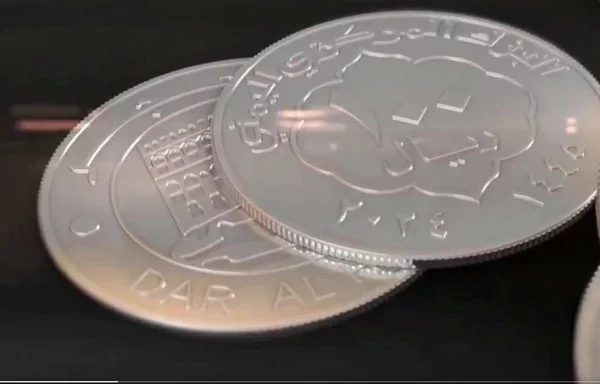Economy
Houthis mint new coin amid financial crisis they created
The new 100-YER coin is a sign of the economic pressure the Houthis are feeling -- and imposing on Yemen -- as a result of their Red Sea aggression.

By Al-Fassel |
The Houthis have issued a new 100-YER coin in a move denounced as "escalatory" by the Central Bank of Aden, which described the new currency as "illegal" and "fake" and urged people not to use it.
Sanaa Central Bank governor Hashem Ismael, who revealed the new coin during a March 31 news conference in the Houthi-controlled city, said the new coin will replace damaged 100-YER banknotes, the Arab News reported.
The Iran-backed group said it also planned to introduce coins in lower denominations in the future.
"The Houthi militia will be held accountable for this irresponsible escalation, as well as the resulting complexity and uncertainty in people's transactions with financial and banking institutions," the Central Bank of Aden said in a statement.
![A man holds a torn Yemeni banknote at a currency exchange office in Sanaa on August 16, 2021. [Mohammed Huwais/AFP]](/gc1/images/2024/04/10/46319-torn-yemeni-riyal-600_384.webp)
In 2016, Yemen's legitimate government moved the Central Bank of Yemen from Sanaa to Aden. But the Houthis continued to operate a Central Bank in Sanaa, setting up a rival structure that has caused financial chaos in Yemen.
Asked about the new coin at an April 3 briefing, US envoy for Yemen Tim Lenderking said it was a sign of the economic pressure the Houthis are facing as a result of their own actions in the Red Sea.
These are negatively affecting Yemen as well as other countries such as Egypt, which "is taking a terrible hit as a result of attacks on the Red Sea, with revenues from the Suez Canal decreasing by 50%," he said.
The impact of the Houthis' attacks "is spread out and being felt by ordinary people, ordinary consumers, and obstructing the movement of fuel, food, medicine to people who need it around this entire region," he added.
"These negative impacts are due exclusively to Houthi recklessness and Iran's efforts to sow instability across the region," Lenderking said.
"These attacks serve nothing more than a narrow Houthi agenda. Iran continues to enable these attacks through arms funding and intelligence support to the Houthis, reminding the world that they are the leading sponsor of terrorism."
Threat to financial stability
The Houthis' interference in Yemen's financial system has already caused a series of problems for the impoverished country, and continues to threaten the stability of the riyal-based system.
In January 2020, the Houthis banned the use of new banknotes printed by the Central Bank of Aden, and money changers stopped dealing with them under the threat of a 10-year jail term.
A glut of new banknotes in circulation in government-controlled areas pushed up inflation, while in Houthi-controlled areas of the country, people rushed to convert their old notes into other currencies on the black market.
The move slashed purchasing power and effectively created two separate exchange rates, as well as spawning a number of cases of counterfeiting.
The new coin will deepen the economic divide and worsen the economic war between the Yemeni government and the Houthis, Studies and Economic Media Center director Mustafa Nasr told the Arab News.
"This measure serves as a test of the pulse to continue producing further monetary denominations of currency as needed, as well as establishing an independent economy," Nasr said.
Liquidity crisis in Yemen
"What this shows us is that there is economic pressure that the Houthis are facing," Lenderking said during a special briefing from the US State Department's Dubai Regional Media Hub.
Lenderking was speaking from Muscat following a visit to Saudi Arabia for engagements with partners helping lead the effort to promote regional stability.
"I've talked about the economic pressure that the Houthis are placing on international shipping, which is harming regional economies, but it's also harming Yemen," he said.
He pointed to a 15% reduction in ships being able to dock at al-Hodeidah port, and noted that the Houthis' attacks on Red Sea shipping have obstructed humanitarian supplies from reaching the Yemeni people.
"And so I think what this introduction of a new coin shows is economic pressure that is being felt by the Houthis," Lenderking said. "There is a liquidity crisis in Yemen."
"What this all points to is the importance of returning Yemen to a period of stability where its economic resources can be used to promote stability and benefit for all Yemenis," he added.
That is why "we need to make this push toward the Yemen peace effort, which will help the humanitarian situation and also help Yemen -- Yemenis rebuild their economy," he said.
The United States is the world's leading donor of humanitarian assistance for Yemen, providing almost $6 billion in assistance since the current conflict began.
The new currency is a replacement for the crippled one, meaning the people replace the wrecked one hundred riyal paper currency with the new metal currency, which means there is no fear.